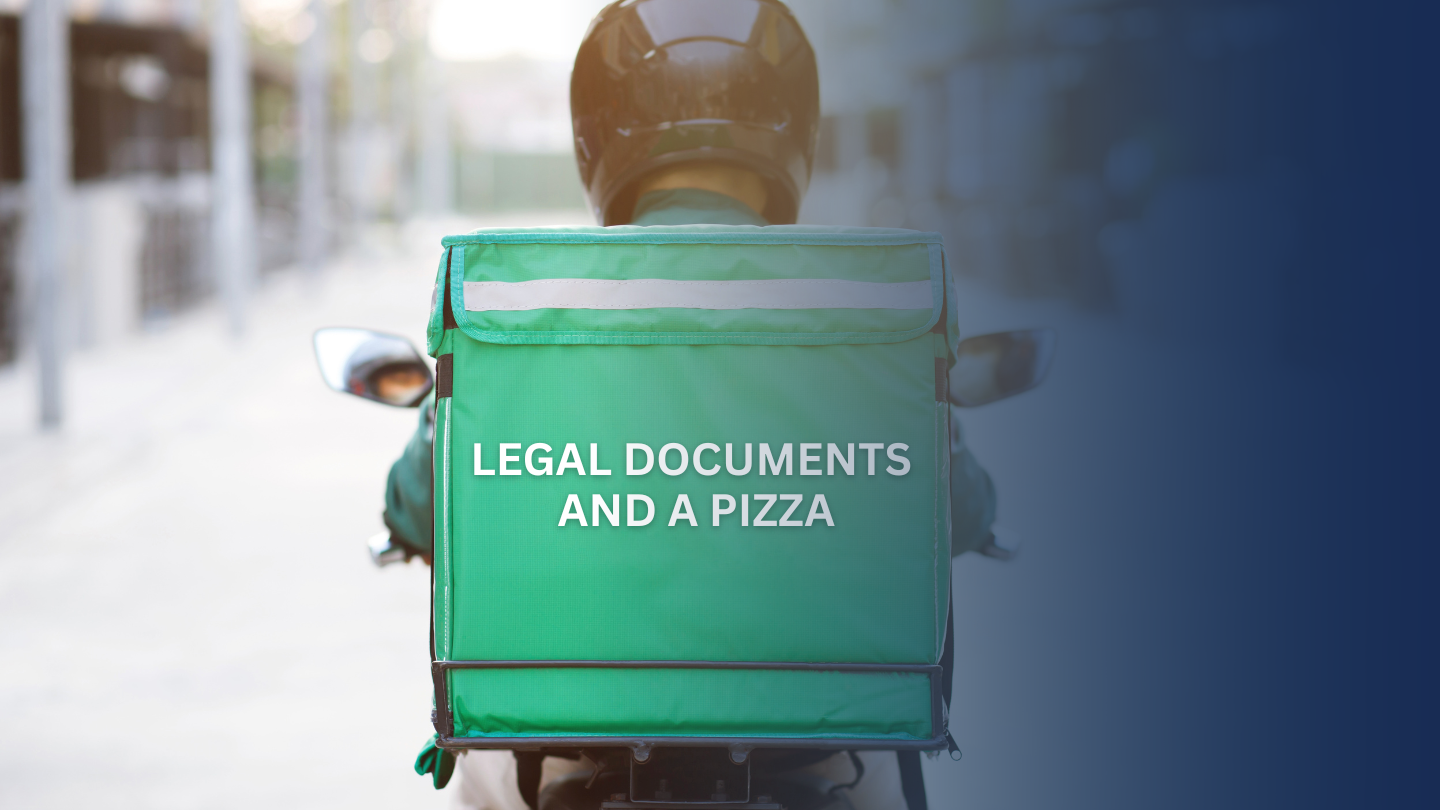Found a Cheap Process Server? Your Documents May Be Resting on a Happy Meal
Found a Cheap Process Server? Your Documents May Be Resting on a Happy Meal
In recent weeks we’ve seen adverts pitching process serving work to gig-economy drivers as an easy “side hustle” marketed specifically towards Uber Eats, Deliveroo and Amazon drivers. We want to be very clear on our stance on this; we believe that this is abhorrent behaviour.

These adverts treat the job like a simple delivery run, glossing over the very real complexities involved. In fact, process serving is a specialist legal role – a court duty, not a pizza drop-off. A botched pizza delivery is merely inconvenient, but a botched court delivery can derail your entire case. Companies responsible for these online ads even erringly treat process servers as interchangeable gig workers, despite the fact that they are responsible for upholding someone’s legal rights. In short, this “side-hustle” pitch wildly underplays the demands and risks of the task.
Process Serving is Serious Business
Serving legal documents requires precision, knowledge and care. Strict court rules (Civil Procedure Rules, etc.) govern how and when papers must be handed over. Get it wrong – for example, by serving the wrong person or using an improper method – and an entire case can be thrown off track.
In other words, a simple mistake (the wrong address, a missing affidavit, a poorly filled statement) can waste time, money and even lead to case dismissal. Professional process servers train for this: they learn which documents require special handling, how to identify evasive recipients, and how to document every attempt. They may work late at night, in unfamiliar neighbourhoods or even hostile situations – none of which a typical delivery gig would prepare you for. The bottom line is that process serving isn’t a casual task; it’s a technical legal process that demands the right expertise and attention.

The Real Dangers: Assaults and Violence
Another aspect the side-hustle ads ignore is risk. Serving legal papers can expose people to aggression. In recent months two of our own experienced servers were physically attacked while carrying out a serve. Industry bodies report this is increasingly common. The Association of British Investigators (ABI) warns that its members “in the role of Process Server… are being assaulted when going about the legitimate task” of delivering due process. These aren’t isolated anecdotes: any server may face anger, abuse or even violence from an unwilling recipient. Sometimes the police arrive and (confusing the server for a bailiff or intruder) treat the reporter with contempt. Such incidents underscore the need for proper training and backup. It also illustrates why labelling the job as an “easy side-hustle” is deceptive: a person knocking on a hostile doorstep needs to know how to handle confrontation.
Exploiting the Vulnerable
Targeting food couriers or desperate gig workers with slick ads is also exploitative. Many delivery drivers work long hours for uncertain pay. To lure them into process serving with promises of “easy” earnings – when the reality is legal work with no simple guidelines – is irresponsible. It sets up people who may lack legal training, resources or support to tackle a stressful task. We consider this practice not just misleading but cruel. A driver rushing from a pizza delivery is not expecting to end up in a confrontation at someone’s front door. Tremark’s view is that abusing someone’s financial vulnerability in this way is unacceptable. Workers should be informed, not deceived into dangerous work.
We would also like to take a moment to specifically point out one of the requirements for the advertised job role… It’s deeply troubling that these adverts target people with only “basic written English,” a.k.a individuals who may not fully understand the legal or personal risks involved. Sending someone who may struggle to explain themselves into a situation where they could be accused of trespassing, harassment, or intimidation isn’t just irresponsible – it’s exploitative.

Rigorous Vetting: The Tremark Standard
At Tremark we ensure our team meets the highest security standards. We adhere to the BS7858 code of practice – the British Standard for screening security personnel – applying it to every process server. BS7858 lays out best-practice recommendations for pre-employment checks in roles where people’s safety and sensitive information are involved. In practice, this means each candidate undergoes a full background check. For example:
- Identity and address verification: We confirm each person’s name, date of birth and home address.
- Employment and financial history: We scrutinise the last five years of work and financial records.
- Criminal and security checks: We check criminal records, terrorism watchlists and other disqualifying factors.
- Character references and right-to-work: We interview referees and verify legal work status.
Only those who pass every hurdle are approved. In short, BS7858 is designed to filter out anyone unreliable or dishonest. The result for clients is clear: you get thoroughly screened, law-trained servers… Not random strangers with apps.

Clients Deserve Professionalism
As a client, you deserve much more than a delivery-driver mentality behind your court papers. Your case could be riding on these documents, so wouldn’t you want them handled by someone with legal know-how?
Think of it this way: you wouldn’t trust a takeaway courier with your confidential tax return, so why trust one with summonses?
In practical terms, a professional server does far more than snap a photo at the door. They write a sworn proof of service – a court document detailing exactly who was served, when and how. They understand which forms require special handling (divorce papers, injunctions, etc.) and what to do if the recipient refuses. They also protect confidentiality and know how to document every attempt correctly.
In contrast, an untrained gig-worker might not know the legal significance of a missing signature or a botched affidavit. Clients should insist on full transparency: ask how documents will be served and who will do it. If the only answer is a mention of “easy cash per job” with no discussion of standards, that is a warning sign.
You have a right to ask questions about qualifications, training, and professional membership (for example, The Association of British Investigators). Don’t be shy when your documents are too important to leave to chance.
Do Your Due Diligence
It’s worth remembering that the UK’s process serving industry has no formal regulation. Anyone (who isn’t directly involved in the case) can call themselves a process server. This places the onus on you to choose carefully. Always ask: how does this company vet its staff? Are they licensed or certified? Is the person who serves the papers a direct employee or a casual contractor? Reputable firms will openly share their credentials (for example, Tremark is proud to have our BS102000/ISO9001 certification and ABI membership). If a firm is evasive or vague, think twice. Clients deserve to know exactly who will turn up at the door and under what standards.
Conclusion: Vet Your Process Server Carefully
We encourage every client to research the process-serving firm they use. Scrutinise the fine print: who carries out the service, and what are their qualifications? Look for statements of compliance with standards (British Standard or ISO), and any professional affiliations. Ask to see an example affidavit or proof of service. In short, be as thorough as you would when hiring a solicitor or accountant. Your documents and your case deserve nothing less than a fully trained professional at the wheel – not someone who has your entire legal case propped up against a Happy Meal in the backseat.
Categories
- Guidance
- Industry News
- News & Views
- Process Serving
Popular Blogs









